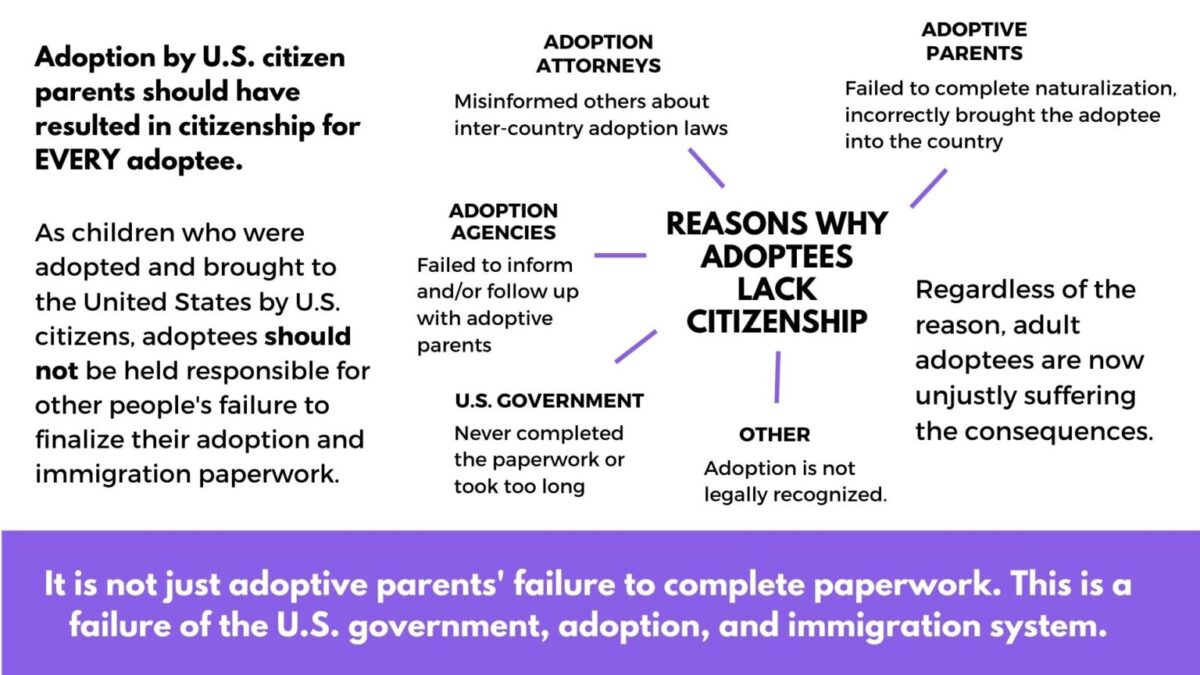By Guest Contributor: Olivia Zalecki
It is 2 am and, like the reasonable young person I am, I’ve traded sleep for the almost too close for comfort act of scrolling aimlessly through my Instagram page. Dispersed between the typical photos of food and friends, I came across a post by an adoption organization. The post featured an image of a young Chinese child. My thumb hovered over the image. In the photo the sweet child was captured giggling in the arms of a white volunteer. The caption underneath read, “Help them find their loving forever family.”
I have seen images like this before. The messaging was hardly anything new. As a Chinese adoptee, I am well aware of the pervasiveness of such messaging.
November is National Adoption Awareness Month (NAAM). This time of year my feed becomes saturated with adoption-related posts like the one mentioned. There is a crucial distinction to be made between adoption-related and adoptee-created posts. The former, in my experience, usually involves organizations promoting adoption as a “public good” and many adoptive parents virtue-signaling how adopting their child from [insert any foreign nation here] saved them.
However, the non-adopted community often doesn’t realize that these posts don’t tell the whole story. Adoption does not always come with a “forever family” or a happily ever after.
The non-adopted community often doesn’t realize that these posts don’t tell the whole story. Adoption does not always come with a “forever family” or a happily ever after.
As I reflect on this statement , I think of stories like that of Huxley Stauffer , the Chinese child who was adopted by a white family before being “rehomed” by his then-adoptive mother . She claimed she was “naive” as to what adopting him would entail. I think about the many adoptees who are adopted into abusive households or the adoptees who attempt suicide at four times the rate of non-adoptees. I also think about the deeply troubling fact that there are far too many U.S. adoptees without citizenship, despite being adopted by U.S. citizens. This is due to a variety of reasons: adoption attorneys who are misinformed about the process, adoption agencies who failed to follow up with adoptive parents regarding paperwork, and adoptive parents who did not complete the naturalization process for their child.
International adoption and immigration are inexorably intertwined. It is a mistake in our national dialogue concerning immigration when we exclude intercountry adoptees.
International adoption and immigration are inexorably intertwined. It is a mistake in our national dialogue concerning immigration when we exclude intercountry adoptees. And the United States has failed many intercountry adoptees. Over 500,000 children since 1948 have been adopted internationally by U.S. citizens. However, due to the negligence of adoptive parents, governments, adoption agencies, and others, there are so many U.S. adoptees without citizenship today. And, the adoptee pays the price for that negligence.
Mauricio Capelli and Anissa Drusedow are just two examples of intercountry adoptees without citizenship who have been unjustly deported. These are unfortunately not isolated incidents. Adoptee-led advocacy organization Adoptees for Justice has estimated that intercountry adoptees have been deported to at least 28 different countries. Imagine being adopted as a child from another country and believing your entire life that you are a U.S. citizen, only to find out that someone else dropped the ball when completing your naturalization paperwork. Then imagine being subsequently told you are ineligible for citizenship when trying to amend this egregious overlook.
That’s where the Adoptee Citizenship Act comes in. This legislation, introduced in 2019, would provide automatic citizenship to qualifying international adoptees who were adopted by a U.S. citizen parent, regardless of the date the adoption was finalized, birthdate, or entering visa. It would provide the citizenship all adoptees are entitled to as the children of U.S. citizens, end the unequal treatment between adopted and biological children of U.S. citizens, and allow deported adoptees to come home, reunite with their families, and rebuild their lives. Being a transnationally and transracially adopted person brings with it a unique set of challenges. For those who grapple with being separated from their birth families, who must deal with the complexity of race relations, having the additional burden of worrying about one’s citizenship status and possible deportation would be soul-crushing.
Congress has the chance to carry through on promises made to adoptees that this country is our home, too. All they have to do is pass the Adoptee Citizenship Act.
Now, we are at an absolutely critical moment to push for adoptee citizenship. In the wake of government actions that have been anything but friendly to immigrants — from the USCIS surreptitiously announcing a premium processing fee increase to policies that cut legal immigration in half — the United States must do better.
Promoting adoption while refusing to grant citizenship for adoptees must end. There are steps that we can all take to ensure this bill is seen by lawmakers. It is important to sign the Adoptees for Justice Support Letter which will be sent to your U.S. Representative and Senators to demonstrate constituent support for the bill. You can also sign up for a virtual meeting with your Representatives where you, along with staff at Adoptees for Justice, will discuss the bill and its urgency with Congress members.
Congress has the chance to carry through on promises made to adoptees that this country is our home, too. All they have to do is pass the Adoptee Citizenship Act.

Olivia is a graduate of North Carolina State University with degrees in Political Science and Foreign Languages and Literatures. Her work centers advocacy and policy that amplifies the voices of youth and communities of color. Olivia is a transnational adoptee and a member of Adoptees for Justice. Learn more about adoptee citizenship at adopteesforjustice.org.
Learn more about Reappropriate’s guest writing program and submit your work here.

